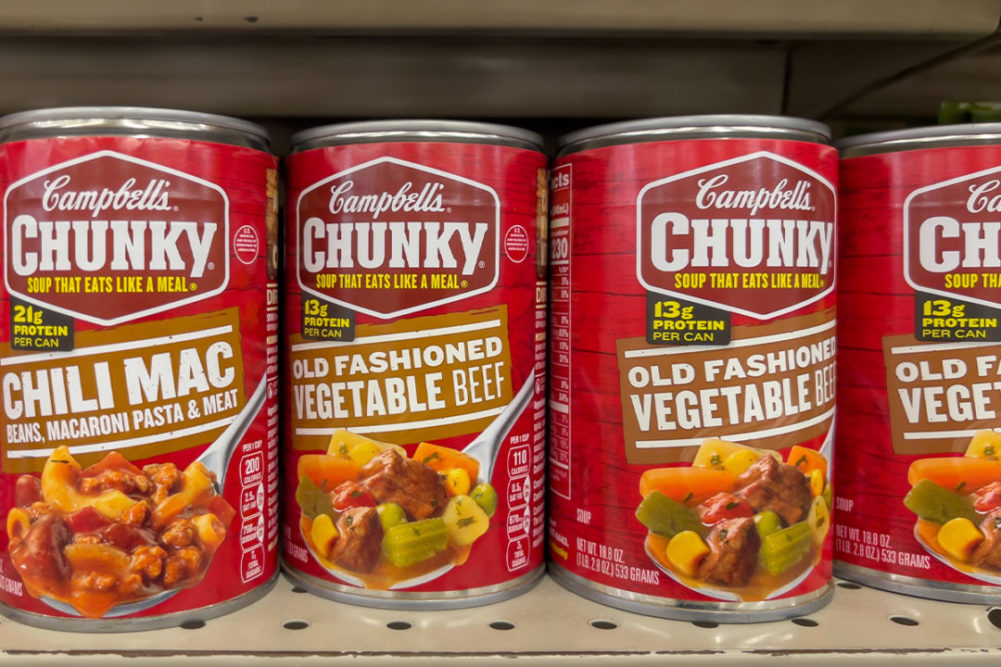PARIS — For Campbell Soup president and chief executive officer Mark A. Clouse, having a year to settle in before the coronavirus pandemic arrived has proved invaluable to the past several years of success at the Camden, NJ-based maker of soups, snacks and beverages.
Clouse was named president and CEO of the company in December 2018. Upon arrival, he quickly turned his attention to the company’s focus and leverage.
“So, the need to kind of re-anchor the portfolio and where I would say our competencies really align well was the first step,” Clouse said of his initial strategy during a June 15 presentation at the Deutsche Bank dbAccess Global Consumer Conference in Paris. “As you might remember, we sold about $3 billion worth of assets, and these were really brands that tended to be a hope of being able to move into some perceived kind of higher-growth areas of the store categories. But arguably, not necessarily aligned with what we did particularly well.”
Clouse said Campbell Soup was dealing with an international business that wasn’t particularly scaled and, as a result, made for a diffused level of focus in the company. As a first step, the company sought to anchor its operations around its core North America business featuring two divisions and 13 categories.
Clouse said taking this approach enabled Campbell Soup to address one of its bigger liabilities: debt level.
“The combination of getting focus in the company and cleaning up the balance sheet was incredibly important as it related to kind of first steps as we head into the pandemic,” he said.
In addition to getting focus and cleaning up the balance sheet, there was a lot of cultural work that needed to happen as well, Clouse said. He said the company sought to bring back a level of accountability and orientation to growth in its Meals and Beverages business, which had been positioned as the “cash engine” or the “profit center” of the company.
“And that, as we all know, always sounds good, very rarely results in the outcome that you need and always easy to look back and point out what was wrong, but I think the unintended consequence of the strategy was our Meals and Beverages business was under-resourced, under-supported,” he explained. “And so, building that back up, changing the belief in what that business could be and then supporting it appropriately to begin to build momentum. And all of that, luckily, we were able to achieve before we got into the pandemic. And although maybe hard to remember, actually we're seeing some momentum in those areas.”
Then, after a little more than a year on the job, COVID hit.
“It was a mixed set of variables for us,” Clouse said. “It created a tremendous amount of complexity and challenge across our organization and our network. But arguably, it was also a fairly substantial catalyst to trial and new consumers entering into our businesses and franchises.”
While Campbell Soup executives felt confident that snacks was a business that in Clouse’s words “had grown before, has grown during (and) will grow after,” there was more uncertainty surrounding Meals and Beverages. That uncertainty has faded, though, and the progress the company has made in the Meals and Beverages unit since the pandemic has been significant, he said.
“I look at a brand like Chunky soup, which pre-pandemic or pre-turnaround honestly was seen as a value business that you bought 10-for-$10 and you waited until it was on deal and yet filled you up and you liked it, but it wasn't necessarily seen as something that perhaps every day would be part of your routine,” Clouse explained. “And I think what happened during COVID is, as people began to experience that brand, they discovered that quality actually was really good, a lot better than 10-for-$10 and that — we then paired it with a lot of great marketing oriented on what its points of difference were, things like protein and convenience, still great value. That business, in the last two years, so that’s after the bump of COVID, on top of that first spike, two years in addition, we're up 25%, two share points.”
Clouse said the company is now seeing younger consumers eat Chunky every day. And the company is bringing innovation to the table as well.
“I don’t know that we’ll win a lot of awards for the idea of spicy chicken noodle, but when you think about the millennial target or younger consumers, complete home run,” he said. “And so I think this idea of bringing relevance back was the other big part of the strategy, and I feel great about that.”


